Professional Ethics: Applying ACS Code of Conduct to a Case Study
VerifiedAdded on 2023/06/15
|5
|1306
|235
Report
AI Summary
This assignment addresses an ethical dilemma faced by an IT manager, Hardeep, and resolves it by applying the Australian Computer Society (ACS) Code of Ethics and relevant sections of the Corporations Act 2001. The dilemma involves choosing between a superior offer from Company A and supporting a friend's company, Company B. The solution emphasizes prioritizing the public interest and the employer's interests over personal relationships, aligning with the ACS values of Primacy of Public Interest, Honesty, and Enhancement of Quality of Life. The report details the steps taken to resolve the dilemma, including recognizing the moral issue, identifying stakeholders, evaluating ethical values, and comparing the situation with legal principles. Ultimately, the recommendation is to accept Company A's offer to ensure compliance with ethical and legal standards. Desklib provides a platform for students to access similar solved assignments and study resources.
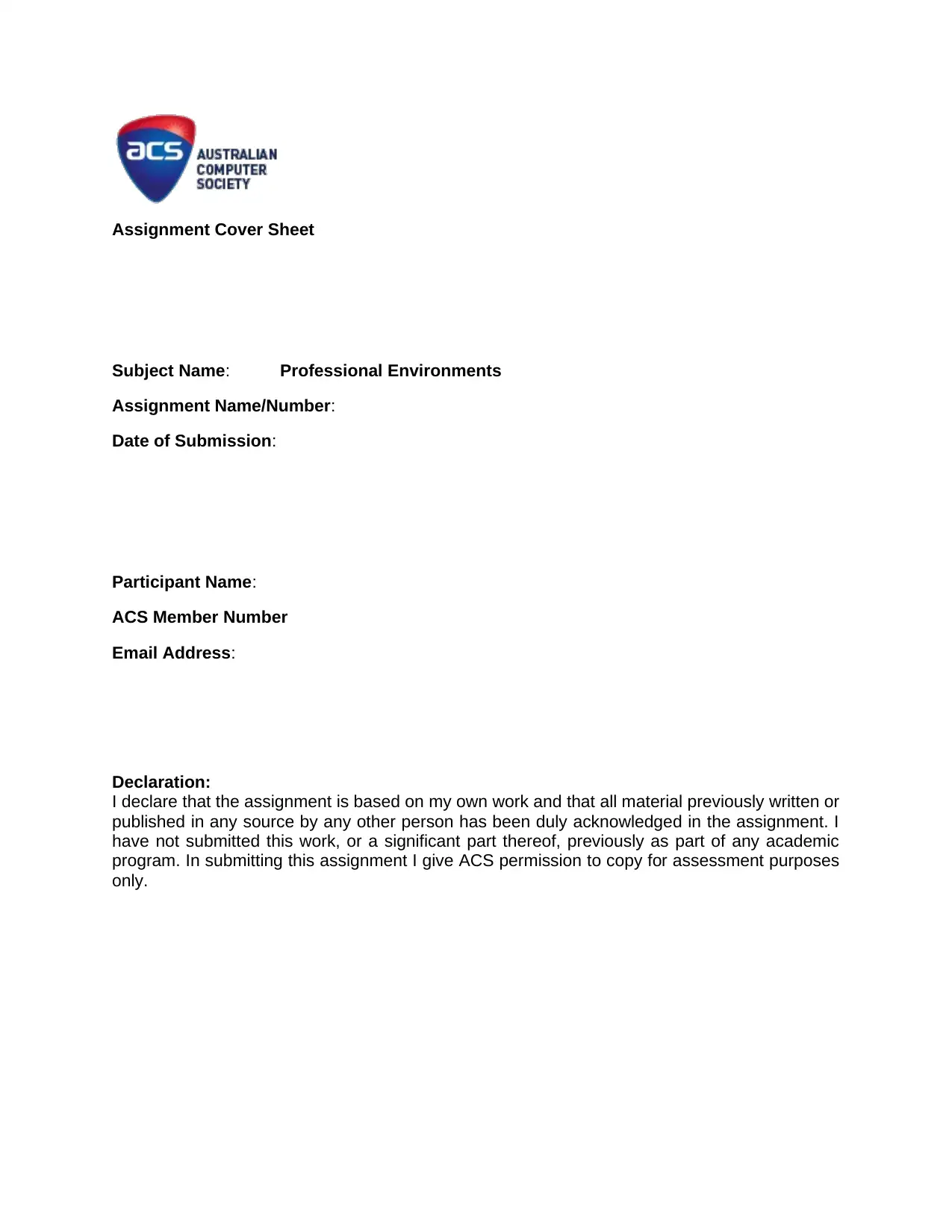
Assignment Cover Sheet
Subject Name: Professional Environments
Assignment Name/Number:
Date of Submission:
Participant Name:
ACS Member Number
Email Address:
Declaration:
I declare that the assignment is based on my own work and that all material previously written or
published in any source by any other person has been duly acknowledged in the assignment. I
have not submitted this work, or a significant part thereof, previously as part of any academic
program. In submitting this assignment I give ACS permission to copy for assessment purposes
only.
Subject Name: Professional Environments
Assignment Name/Number:
Date of Submission:
Participant Name:
ACS Member Number
Email Address:
Declaration:
I declare that the assignment is based on my own work and that all material previously written or
published in any source by any other person has been duly acknowledged in the assignment. I
have not submitted this work, or a significant part thereof, previously as part of any academic
program. In submitting this assignment I give ACS permission to copy for assessment purposes
only.
Paraphrase This Document
Need a fresh take? Get an instant paraphrase of this document with our AI Paraphraser
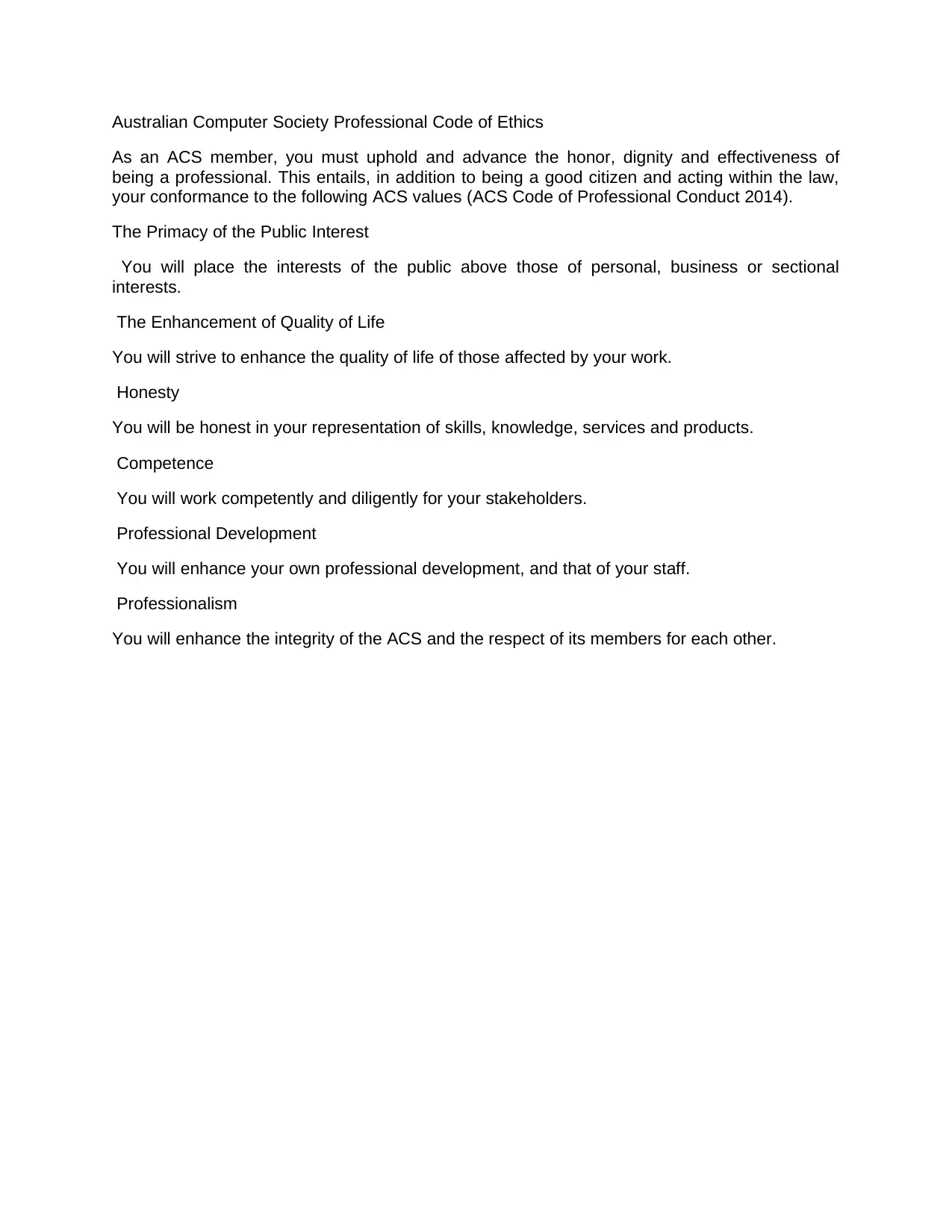
Australian Computer Society Professional Code of Ethics
As an ACS member, you must uphold and advance the honor, dignity and effectiveness of
being a professional. This entails, in addition to being a good citizen and acting within the law,
your conformance to the following ACS values (ACS Code of Professional Conduct 2014).
The Primacy of the Public Interest
You will place the interests of the public above those of personal, business or sectional
interests.
The Enhancement of Quality of Life
You will strive to enhance the quality of life of those affected by your work.
Honesty
You will be honest in your representation of skills, knowledge, services and products.
Competence
You will work competently and diligently for your stakeholders.
Professional Development
You will enhance your own professional development, and that of your staff.
Professionalism
You will enhance the integrity of the ACS and the respect of its members for each other.
As an ACS member, you must uphold and advance the honor, dignity and effectiveness of
being a professional. This entails, in addition to being a good citizen and acting within the law,
your conformance to the following ACS values (ACS Code of Professional Conduct 2014).
The Primacy of the Public Interest
You will place the interests of the public above those of personal, business or sectional
interests.
The Enhancement of Quality of Life
You will strive to enhance the quality of life of those affected by your work.
Honesty
You will be honest in your representation of skills, knowledge, services and products.
Competence
You will work competently and diligently for your stakeholders.
Professional Development
You will enhance your own professional development, and that of your staff.
Professionalism
You will enhance the integrity of the ACS and the respect of its members for each other.
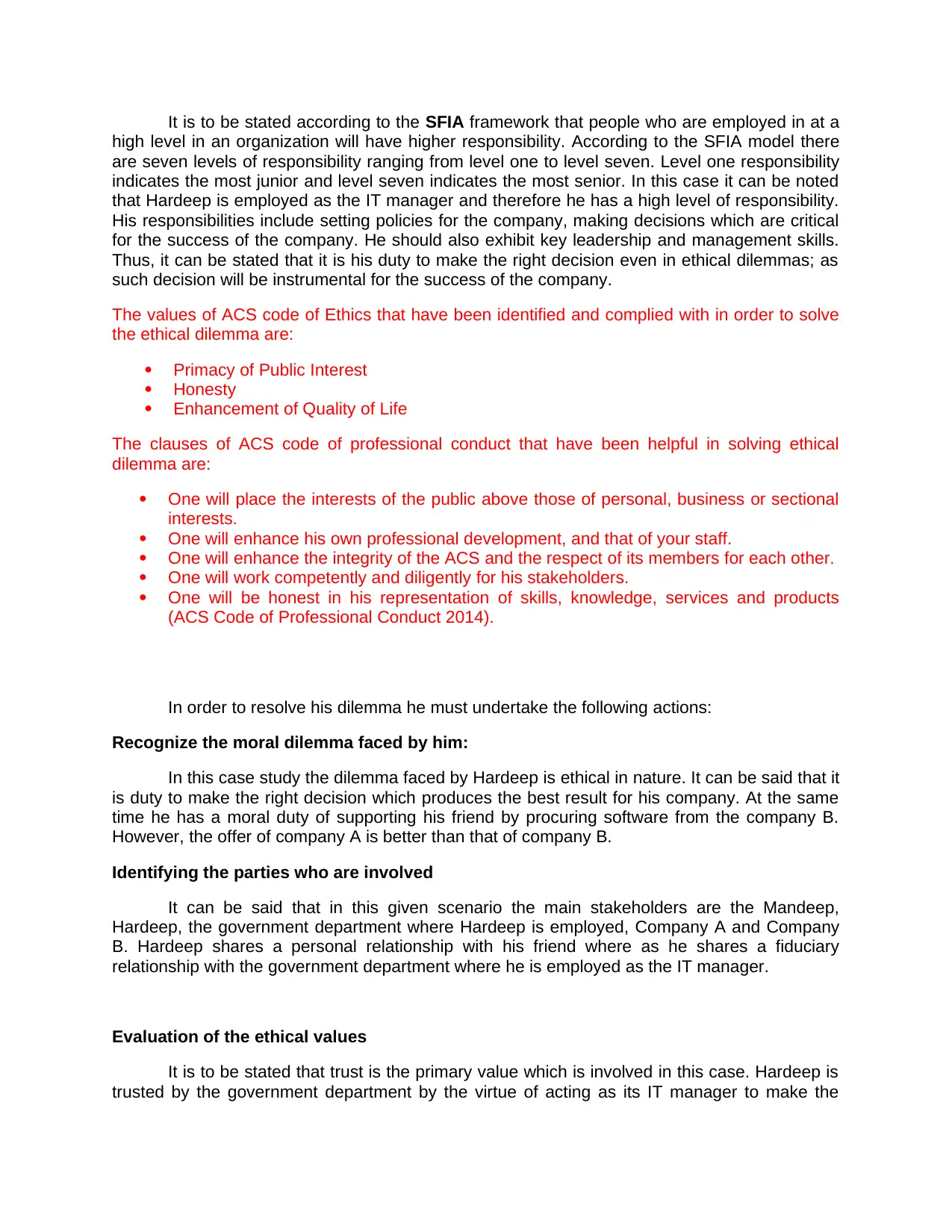
It is to be stated according to the SFIA framework that people who are employed in at a
high level in an organization will have higher responsibility. According to the SFIA model there
are seven levels of responsibility ranging from level one to level seven. Level one responsibility
indicates the most junior and level seven indicates the most senior. In this case it can be noted
that Hardeep is employed as the IT manager and therefore he has a high level of responsibility.
His responsibilities include setting policies for the company, making decisions which are critical
for the success of the company. He should also exhibit key leadership and management skills.
Thus, it can be stated that it is his duty to make the right decision even in ethical dilemmas; as
such decision will be instrumental for the success of the company.
The values of ACS code of Ethics that have been identified and complied with in order to solve
the ethical dilemma are:
Primacy of Public Interest
Honesty
Enhancement of Quality of Life
The clauses of ACS code of professional conduct that have been helpful in solving ethical
dilemma are:
One will place the interests of the public above those of personal, business or sectional
interests.
One will enhance his own professional development, and that of your staff.
One will enhance the integrity of the ACS and the respect of its members for each other.
One will work competently and diligently for his stakeholders.
One will be honest in his representation of skills, knowledge, services and products
(ACS Code of Professional Conduct 2014).
In order to resolve his dilemma he must undertake the following actions:
Recognize the moral dilemma faced by him:
In this case study the dilemma faced by Hardeep is ethical in nature. It can be said that it
is duty to make the right decision which produces the best result for his company. At the same
time he has a moral duty of supporting his friend by procuring software from the company B.
However, the offer of company A is better than that of company B.
Identifying the parties who are involved
It can be said that in this given scenario the main stakeholders are the Mandeep,
Hardeep, the government department where Hardeep is employed, Company A and Company
B. Hardeep shares a personal relationship with his friend where as he shares a fiduciary
relationship with the government department where he is employed as the IT manager.
Evaluation of the ethical values
It is to be stated that trust is the primary value which is involved in this case. Hardeep is
trusted by the government department by the virtue of acting as its IT manager to make the
high level in an organization will have higher responsibility. According to the SFIA model there
are seven levels of responsibility ranging from level one to level seven. Level one responsibility
indicates the most junior and level seven indicates the most senior. In this case it can be noted
that Hardeep is employed as the IT manager and therefore he has a high level of responsibility.
His responsibilities include setting policies for the company, making decisions which are critical
for the success of the company. He should also exhibit key leadership and management skills.
Thus, it can be stated that it is his duty to make the right decision even in ethical dilemmas; as
such decision will be instrumental for the success of the company.
The values of ACS code of Ethics that have been identified and complied with in order to solve
the ethical dilemma are:
Primacy of Public Interest
Honesty
Enhancement of Quality of Life
The clauses of ACS code of professional conduct that have been helpful in solving ethical
dilemma are:
One will place the interests of the public above those of personal, business or sectional
interests.
One will enhance his own professional development, and that of your staff.
One will enhance the integrity of the ACS and the respect of its members for each other.
One will work competently and diligently for his stakeholders.
One will be honest in his representation of skills, knowledge, services and products
(ACS Code of Professional Conduct 2014).
In order to resolve his dilemma he must undertake the following actions:
Recognize the moral dilemma faced by him:
In this case study the dilemma faced by Hardeep is ethical in nature. It can be said that it
is duty to make the right decision which produces the best result for his company. At the same
time he has a moral duty of supporting his friend by procuring software from the company B.
However, the offer of company A is better than that of company B.
Identifying the parties who are involved
It can be said that in this given scenario the main stakeholders are the Mandeep,
Hardeep, the government department where Hardeep is employed, Company A and Company
B. Hardeep shares a personal relationship with his friend where as he shares a fiduciary
relationship with the government department where he is employed as the IT manager.
Evaluation of the ethical values
It is to be stated that trust is the primary value which is involved in this case. Hardeep is
trusted by the government department by the virtue of acting as its IT manager to make the
⊘ This is a preview!⊘
Do you want full access?
Subscribe today to unlock all pages.

Trusted by 1+ million students worldwide
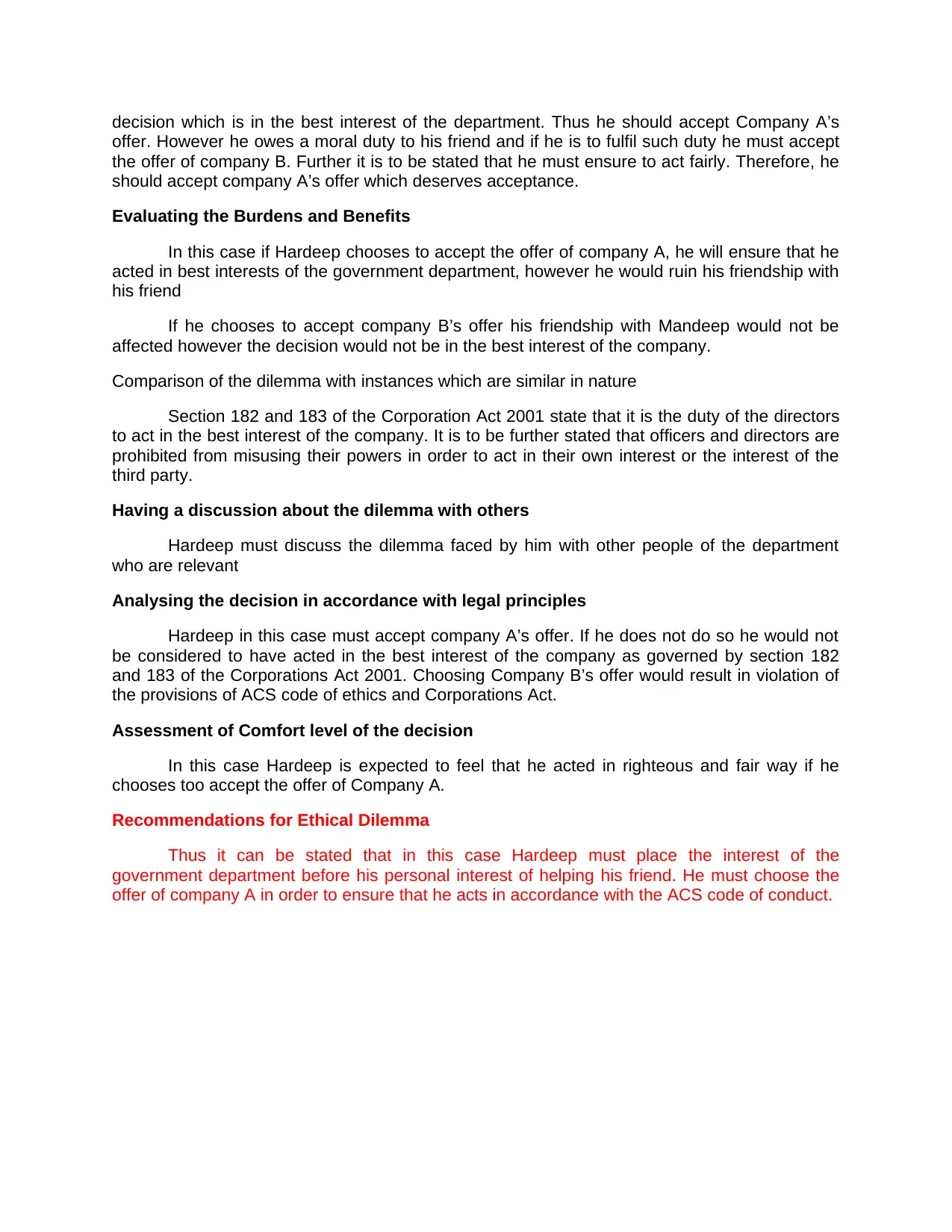
decision which is in the best interest of the department. Thus he should accept Company A’s
offer. However he owes a moral duty to his friend and if he is to fulfil such duty he must accept
the offer of company B. Further it is to be stated that he must ensure to act fairly. Therefore, he
should accept company A’s offer which deserves acceptance.
Evaluating the Burdens and Benefits
In this case if Hardeep chooses to accept the offer of company A, he will ensure that he
acted in best interests of the government department, however he would ruin his friendship with
his friend
If he chooses to accept company B’s offer his friendship with Mandeep would not be
affected however the decision would not be in the best interest of the company.
Comparison of the dilemma with instances which are similar in nature
Section 182 and 183 of the Corporation Act 2001 state that it is the duty of the directors
to act in the best interest of the company. It is to be further stated that officers and directors are
prohibited from misusing their powers in order to act in their own interest or the interest of the
third party.
Having a discussion about the dilemma with others
Hardeep must discuss the dilemma faced by him with other people of the department
who are relevant
Analysing the decision in accordance with legal principles
Hardeep in this case must accept company A’s offer. If he does not do so he would not
be considered to have acted in the best interest of the company as governed by section 182
and 183 of the Corporations Act 2001. Choosing Company B’s offer would result in violation of
the provisions of ACS code of ethics and Corporations Act.
Assessment of Comfort level of the decision
In this case Hardeep is expected to feel that he acted in righteous and fair way if he
chooses too accept the offer of Company A.
Recommendations for Ethical Dilemma
Thus it can be stated that in this case Hardeep must place the interest of the
government department before his personal interest of helping his friend. He must choose the
offer of company A in order to ensure that he acts in accordance with the ACS code of conduct.
offer. However he owes a moral duty to his friend and if he is to fulfil such duty he must accept
the offer of company B. Further it is to be stated that he must ensure to act fairly. Therefore, he
should accept company A’s offer which deserves acceptance.
Evaluating the Burdens and Benefits
In this case if Hardeep chooses to accept the offer of company A, he will ensure that he
acted in best interests of the government department, however he would ruin his friendship with
his friend
If he chooses to accept company B’s offer his friendship with Mandeep would not be
affected however the decision would not be in the best interest of the company.
Comparison of the dilemma with instances which are similar in nature
Section 182 and 183 of the Corporation Act 2001 state that it is the duty of the directors
to act in the best interest of the company. It is to be further stated that officers and directors are
prohibited from misusing their powers in order to act in their own interest or the interest of the
third party.
Having a discussion about the dilemma with others
Hardeep must discuss the dilemma faced by him with other people of the department
who are relevant
Analysing the decision in accordance with legal principles
Hardeep in this case must accept company A’s offer. If he does not do so he would not
be considered to have acted in the best interest of the company as governed by section 182
and 183 of the Corporations Act 2001. Choosing Company B’s offer would result in violation of
the provisions of ACS code of ethics and Corporations Act.
Assessment of Comfort level of the decision
In this case Hardeep is expected to feel that he acted in righteous and fair way if he
chooses too accept the offer of Company A.
Recommendations for Ethical Dilemma
Thus it can be stated that in this case Hardeep must place the interest of the
government department before his personal interest of helping his friend. He must choose the
offer of company A in order to ensure that he acts in accordance with the ACS code of conduct.
Paraphrase This Document
Need a fresh take? Get an instant paraphrase of this document with our AI Paraphraser
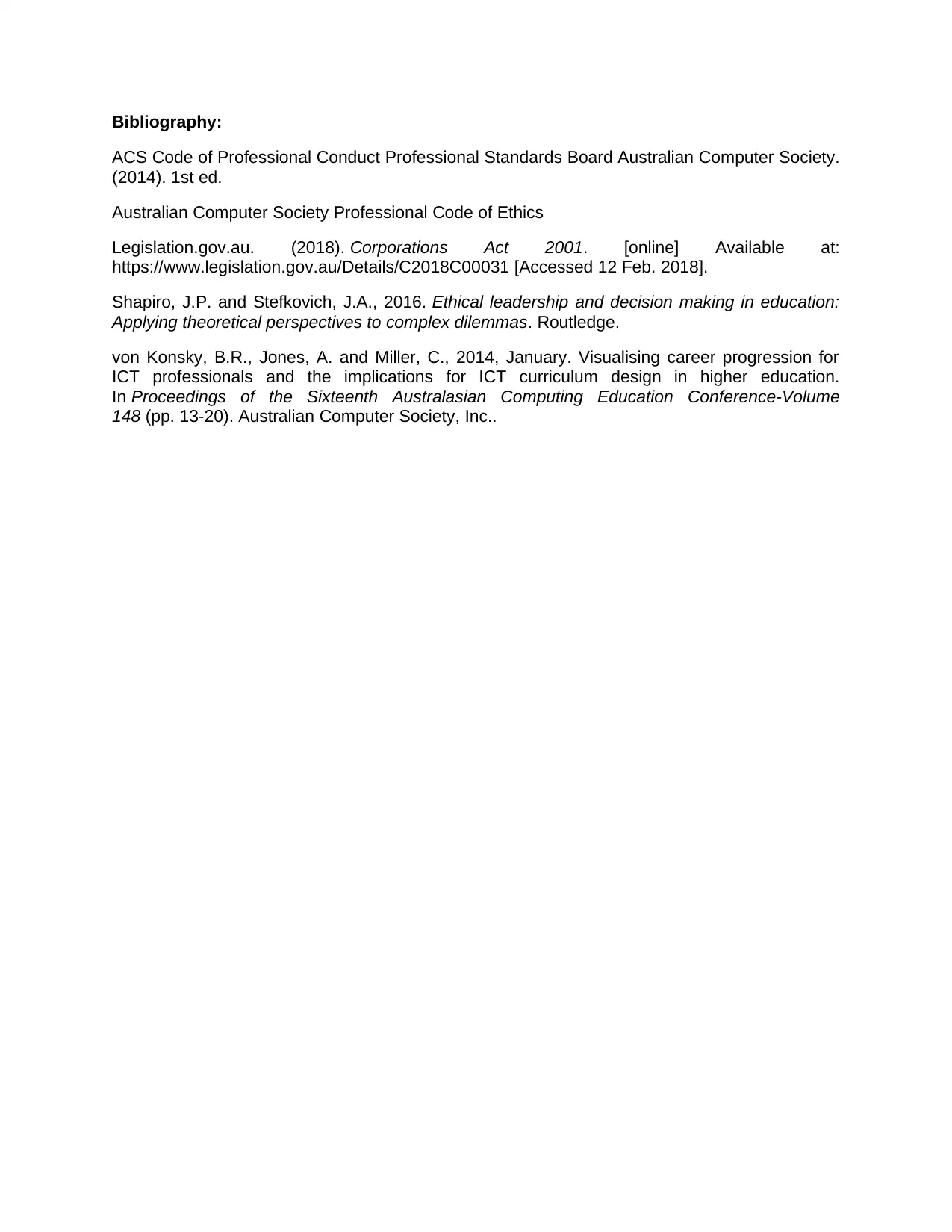
Bibliography:
ACS Code of Professional Conduct Professional Standards Board Australian Computer Society.
(2014). 1st ed.
Australian Computer Society Professional Code of Ethics
Legislation.gov.au. (2018). Corporations Act 2001. [online] Available at:
https://www.legislation.gov.au/Details/C2018C00031 [Accessed 12 Feb. 2018].
Shapiro, J.P. and Stefkovich, J.A., 2016. Ethical leadership and decision making in education:
Applying theoretical perspectives to complex dilemmas. Routledge.
von Konsky, B.R., Jones, A. and Miller, C., 2014, January. Visualising career progression for
ICT professionals and the implications for ICT curriculum design in higher education.
In Proceedings of the Sixteenth Australasian Computing Education Conference-Volume
148 (pp. 13-20). Australian Computer Society, Inc..
ACS Code of Professional Conduct Professional Standards Board Australian Computer Society.
(2014). 1st ed.
Australian Computer Society Professional Code of Ethics
Legislation.gov.au. (2018). Corporations Act 2001. [online] Available at:
https://www.legislation.gov.au/Details/C2018C00031 [Accessed 12 Feb. 2018].
Shapiro, J.P. and Stefkovich, J.A., 2016. Ethical leadership and decision making in education:
Applying theoretical perspectives to complex dilemmas. Routledge.
von Konsky, B.R., Jones, A. and Miller, C., 2014, January. Visualising career progression for
ICT professionals and the implications for ICT curriculum design in higher education.
In Proceedings of the Sixteenth Australasian Computing Education Conference-Volume
148 (pp. 13-20). Australian Computer Society, Inc..
1 out of 5
Related Documents
Your All-in-One AI-Powered Toolkit for Academic Success.
+13062052269
info@desklib.com
Available 24*7 on WhatsApp / Email
![[object Object]](/_next/static/media/star-bottom.7253800d.svg)
Unlock your academic potential
Copyright © 2020–2026 A2Z Services. All Rights Reserved. Developed and managed by ZUCOL.





